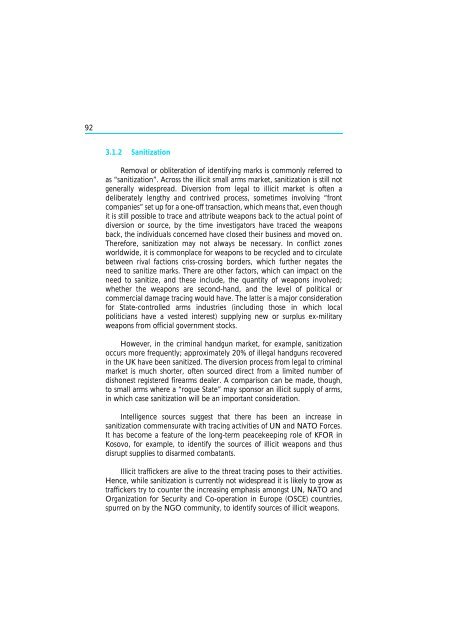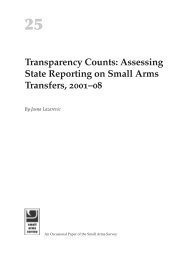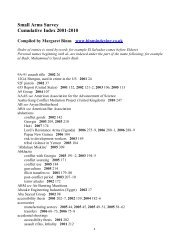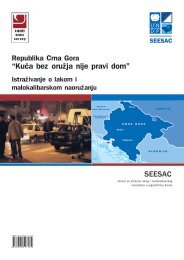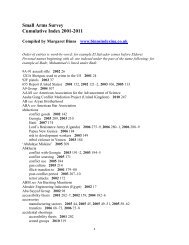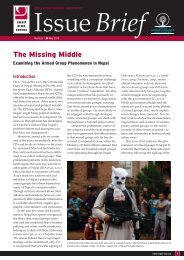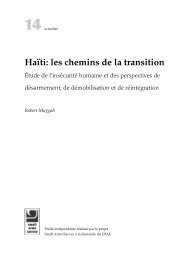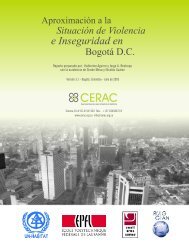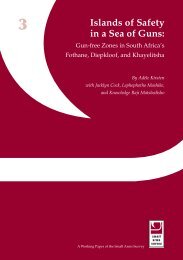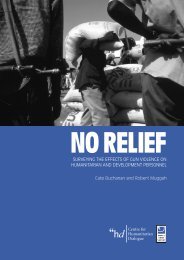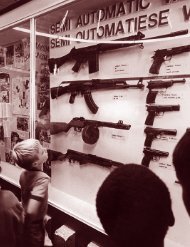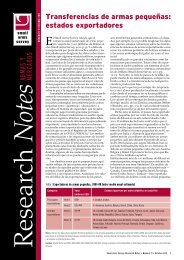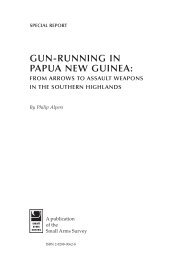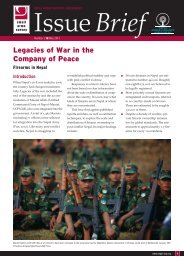The Scope and Implications of a Tracing Mechanism for Small Arms ...
The Scope and Implications of a Tracing Mechanism for Small Arms ...
The Scope and Implications of a Tracing Mechanism for Small Arms ...
You also want an ePaper? Increase the reach of your titles
YUMPU automatically turns print PDFs into web optimized ePapers that Google loves.
92<br />
3.1.2 Sanitization<br />
Removal or obliteration <strong>of</strong> identifying marks is commonly referred to<br />
as “sanitization”. Across the illicit small arms market, sanitization is still not<br />
generally widespread. Diversion from legal to illicit market is <strong>of</strong>ten a<br />
deliberately lengthy <strong>and</strong> contrived process, sometimes involving “front<br />
companies” set up <strong>for</strong> a one-<strong>of</strong>f transaction, which means that, even though<br />
it is still possible to trace <strong>and</strong> attribute weapons back to the actual point <strong>of</strong><br />
diversion or source, by the time investigators have traced the weapons<br />
back, the individuals concerned have closed their business <strong>and</strong> moved on.<br />
<strong>The</strong>re<strong>for</strong>e, sanitization may not always be necessary. In conflict zones<br />
worldwide, it is commonplace <strong>for</strong> weapons to be recycled <strong>and</strong> to circulate<br />
between rival factions criss-crossing borders, which further negates the<br />
need to sanitize marks. <strong>The</strong>re are other factors, which can impact on the<br />
need to sanitize, <strong>and</strong> these include, the quantity <strong>of</strong> weapons involved;<br />
whether the weapons are second-h<strong>and</strong>, <strong>and</strong> the level <strong>of</strong> political or<br />
commercial damage tracing would have. <strong>The</strong> latter is a major consideration<br />
<strong>for</strong> State-controlled arms industries (including those in which local<br />
politicians have a vested interest) supplying new or surplus ex-military<br />
weapons from <strong>of</strong>ficial government stocks.<br />
However, in the criminal h<strong>and</strong>gun market, <strong>for</strong> example, sanitization<br />
occurs more frequently; approximately 20% <strong>of</strong> illegal h<strong>and</strong>guns recovered<br />
in the UK have been sanitized. <strong>The</strong> diversion process from legal to criminal<br />
market is much shorter, <strong>of</strong>ten sourced direct from a limited number <strong>of</strong><br />
dishonest registered firearms dealer. A comparison can be made, though,<br />
to small arms where a “rogue State” may sponsor an illicit supply <strong>of</strong> arms,<br />
in which case sanitization will be an important consideration.<br />
Intelligence sources suggest that there has been an increase in<br />
sanitization commensurate with tracing activities <strong>of</strong> UN <strong>and</strong> NATO Forces.<br />
It has become a feature <strong>of</strong> the long-term peacekeeping role <strong>of</strong> KFOR in<br />
Kosovo, <strong>for</strong> example, to identify the sources <strong>of</strong> illicit weapons <strong>and</strong> thus<br />
disrupt supplies to disarmed combatants.<br />
Illicit traffickers are alive to the threat tracing poses to their activities.<br />
Hence, while sanitization is currently not widespread it is likely to grow as<br />
traffickers try to counter the increasing emphasis amongst UN, NATO <strong>and</strong><br />
Organization <strong>for</strong> Security <strong>and</strong> Co-operation in Europe (OSCE) countries,<br />
spurred on by the NGO community, to identify sources <strong>of</strong> illicit weapons.


